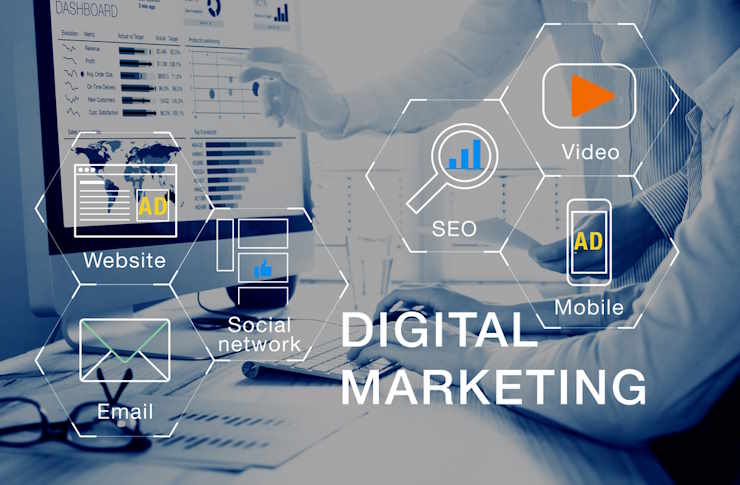Essential Online & Digital Marketing Guide for Small Business
Digital marketing combines online tools and strategies to raise awareness, attract customers, and drive measurable results for a business. It covers search engines, email, social media, paid ads, and content marketing, all of which work together to shape your online presence. For small and medium businesses, a practical digital marketing plan focuses on clear goals, measurable KPIs, and consistent testing to improve performance over time.

What is digital marketing?
Digital marketing is the set of tactics that use internet-connected channels to reach potential customers. Typical components include search engine optimization (SEO), pay-per-click (PPC) advertising, email campaigns, social media management, and analytics. Each channel serves different stages of the customer journey—awareness, consideration, and conversion—so a balanced approach helps reduce risk and maximize ROI. Effective digital marketing is data-driven: tracking metrics like traffic, engagement, and conversion rates lets you iterate and refine strategies.
Digital marketing also requires aligning messaging and creative across channels. Consistency in brand voice and value propositions improves recognition and trust. For local services, integrate location signals and review management to strengthen visibility in your area. Tools such as Google Analytics, ad platforms, and marketing automation can streamline monitoring and reporting, giving small teams the leverage to act on insights without excessive overhead.
How to build an online presence?
An online presence means more than a website; it’s the sum of your profiles, listings, content, and reputation across the web. Start with a responsive website that clearly states who you are, what you offer, pricing or service scope, and contact options. Optimize pages for relevant search terms so prospects can find you organically. Claim and complete business listings on major platforms and maintain consistent name, address, and phone information to boost local credibility.
Content and reviews feed your online presence. Publish helpful resources that answer common customer questions, and encourage satisfied clients to leave reviews. Active engagement—responding to inquiries, sharing updates, and participating in community conversations—further establishes your business as accessible and trustworthy. Over time, these elements compound to increase discoverability and convert casual visitors into customers.
How can a business benefit from digital marketing?
Digital marketing gives businesses predictable ways to attract and retain customers. Compared with many traditional channels, online methods allow precise audience targeting, measurable spend, and adjustable tactics in real time. Small businesses can scale campaigns up or down, test messages quickly, and measure impact on revenue and customer lifetime value. This flexibility supports smarter budgeting and improves decision-making based on performance data rather than intuition.
Beyond acquisition, digital marketing supports retention and loyalty. Email sequences, remarketing ads, and personalized content remind past customers about new offerings and encourage repeat purchases. Analytics also reveal high-value customer segments, so businesses can prioritize resources toward the most profitable audiences. Ultimately, a strategic digital marketing program helps a business grow sustainably while keeping costs aligned with returns.
Which social media strategies work?
Social media strategies should align with your audience and business goals—brand awareness, lead generation, customer service, or e-commerce. Start by identifying where your customers spend time and tailor content to platform norms: image-driven posts for visual platforms, informative threads for professional networks, and short video for high engagement channels. Consistency and authenticity matter more than frequency; a well-crafted weekly plan often outperforms sporadic posting.
Use social media for two-way communication: answer questions, address concerns, and solicit feedback. Paid social advertising can efficiently extend reach and target specific demographics or interests, while organic content builds long-term relationships. Measure engagement rates, referral traffic, and conversion outcomes to determine which formats and messages resonate. Over time, prioritize the channels producing the best mix of visibility and conversions for your business.
Why content marketing matters?
Content marketing fuels long-term growth by attracting and educating potential customers through valuable information rather than direct selling. Blog posts, guides, videos, and downloadable resources establish expertise and help SEO, improving your online presence over time. High-quality content also supports social media and email campaigns by providing shareable assets that reinforce your brand’s authority and trustworthiness.
A content strategy should map topics to customer needs at each stage of the buying process. Early-stage content addresses general problems or trends, while later-stage pieces compare solutions and highlight your unique benefits. Measure content performance using organic traffic, time on page, lead generation, and conversion metrics. Regularly updating and repurposing top-performing content keeps it relevant and maximizes the investment.
Conclusion
Digital marketing and a strong online presence offer scalable, measurable ways for businesses to attract customers and grow. By combining targeted social media, strategic content marketing, and data-driven digital tactics, small businesses can compete effectively and build lasting customer relationships. Consistent execution and ongoing measurement are the keys to long-term improvement and sustainable results.






